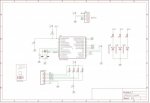Hola:
Estoy probando los ejemplos que tienen www.Microchip.com bajo PIC16F sobre XC8. Este es uno de los ejemplos.
Uso el MPLAB X 1.80 y XC8 con Windows 7.
Al compilarlo pulsando en l aimagen de abajo.

Como respuesta obtengo esto.
Al compilar...

...no compila o eso parece. Muestra mensaje como este:
Launching
No source code lines were found at current PC 0x0
User program stopped
En asm con el PIC16F88 y 16F886 me ocurre lo mismo.
¿Qué es lo que ocurre realmente?
Un saludo.
Estoy probando los ejemplos que tienen www.Microchip.com bajo PIC16F sobre XC8. Este es uno de los ejemplos.
Código:
/**
*******************************************************************
* Lesson 13 - "EEPROM"
*
* This lesson will provide code for writing and reading a single byte onto
* the on-board EEPROM. EEPROM is non-volatile memory, meaning that it does
* not lose its value when power is shut off. This is unlike RAM, which will
* lose its value when no power is applied. The EEPROM is useful for storing
* variables that must still be present during no power.
* It is also convenient to use if the entire RAM space is used up.
* Writes and reads to the EEPROM are practically instant and are much faster
* than program memory operations.
* Press the switch to save the LED state and then disconnect the power. When
* power is then applied again, the program will start with that same LED lit.
* When the lesson is first programmed, no LEDs will light up even with movement
* of the POT. When the switch is pressed, the corresponding LED will be lit and
* then the PIC will go to sleep until the switch is pressed again. Each press of
* the switch saves the ADC value into EEPROM. The PIC uses interrupts to wake up
* from sleep, take an ADC reading, save to EEPROM, and then goes back to sleep.
*
* PIC: 16F1829
* Compiler: XC8 v1.00
* IDE: MPLABX v1.10
*
* Board: PICkit 3 Low Pin Count Demo Board
* Date: 6.1.2012
*
* *******************************************************************
* See Low Pin Count Demo Board User's Guide for Lesson Information*
* ******************************************************************
*/
#include <xc.h> //PIC hardware mapping
#define _XTAL_FREQ 500000 //Used by the XC8 delay_ms(x) macro
#define DOWN 0
#define UP 1
#define SWITCH PORTAbits.RA2
//config bits that are part-specific for the PIC16F1829
#pragma config FOSC=INTOSC, WDTE=OFF, PWRTE=OFF, MCLRE=OFF, CP=OFF, CPD=OFF, BOREN=ON, CLKOUTEN=OFF, IESO=OFF, FCMEN=OFF
#pragma config WRT=OFF, PLLEN=OFF, STVREN=OFF, LVP=OFF
/* -------------------LATC-----------------
* Bit#: -7---6---5---4---3---2---1---0---
* LED: ---------------|DS4|DS3|DS2|DS1|-
*-----------------------------------------
*/
unsigned char adc(void); //prototype
void main(void) {
OSCCON = 0b00111000; //500KHz clock speed
TRISC = 0; //all LED pins are outputs
LATC = 0; //init all LEDs OFF
//setup switch (SW1)
TRISAbits.TRISA2 = 1; //switch as input
ANSELAbits.ANSA2 = 0; //digital switch
//setup ADC
TRISAbits.TRISA4 = 1; //Potentiamtor is connected to RA4...set as input
ANSELAbits.ANSA4 = 1; //analog
ADCON0 = 0b00001101; //select RA4 as source of ADC and enable the module (AN3)
ADCON1 = 0b00010000; //left justified - FOSC/8 speed - Vref is Vdd
//setup interrupt on change for the switch
INTCONbits.IOCIE = 1; //enable interrupt on change global
IOCANbits.IOCAN2 = 1; //when SW1 is pressed/released, enter the ISR
INTCONbits.GIE = 1; //enable global interupts
while (1) {
LATC = eeprom_read(0x00); //load whatever is in EEPROM to the LATCH
SLEEP(); //sleep until button is pressed
}
}
unsigned char adc(void) {
__delay_us(5); //wait for ADC charging cap to settle
GO = 1;
while (GO) continue; //wait for conversion to be finished
return ADRESH; //grab the top 8 MSbs
}
void interrupt ISR(void) {
unsigned char adc_value = 0;
if (IOCAF) { //SW1 was just pressed
IOCAF = 0; //must clear the flag in software
__delay_ms(5); //debounce by waiting and seeing if still held down
if (SWITCH == DOWN) {
adc_value = adc(); //get the ADC value from the POT
adc_value >>= 4; //save only the top 4 MSbs
LATC = adc_value;
//EEPROM is non-volatile, meaning that it can retain its value when no power is applied
eeprom_write(0x00, adc_value); //save the value to EEPROM and go back to sleep
}
}
}Al compilarlo pulsando en l aimagen de abajo.

Como respuesta obtengo esto.
Código:
make -f nbproject/Makefile-default.mk SUBPROJECTS= .build-conf
make[1]: Entering directory `C:/Users/Meta/Desktop/13_EEPROM/eeprom.X'
make -f nbproject/Makefile-default.mk dist/default/production/eeprom.X.production.hex
make[2]: Entering directory `C:/Users/Meta/Desktop/13_EEPROM/eeprom.X'
"C:\Program Files (x86)\Microchip\xc8\v1.12\bin\xc8.exe" --pass1 --chip=16F1829 -Q -G --asmlist --double=24 --float=24 --opt=default,+asm,-asmfile,+speed,-space,-debug --addrqual=ignore --mode=free -P -N255 --warn=0 --summary=default,-psect,-class,+mem,-hex,-file --output=default,-inhx032 --runtime=default,+clear,+init,-keep,-no_startup,+osccal,-resetbits,-download,-stackcall,+clib "--errformat=%%f:%%l: error: %%s" "--warnformat=%%f:%%l: warning: %%s" "--msgformat=%%f:%%l: advisory: %%s" -obuild/default/production/_ext/1472/eeprom.p1 ../eeprom.c
"C:\Program Files (x86)\Microchip\xc8\v1.12\bin\xc8.exe" --chip=16F1829 -G --asmlist -mdist/default/production/eeprom.X.production.map --double=24 --float=24 --opt=default,+asm,-asmfile,+speed,-space,-debug --addrqual=ignore --mode=free -P -N255 --warn=0 --summary=default,-psect,-class,+mem,-hex,-file --output=default,-inhx032 --runtime=default,+clear,+init,-keep,-no_startup,+osccal,-resetbits,-download,-stackcall,+clib "--errformat=%%f:%%l: error: %%s" "--warnformat=%%f:%%l: warning: %%s" "--msgformat=%%f:%%l: advisory: %%s" -odist/default/production/eeprom.X.production.cof build/default/production/_ext/1472/eeprom.p1
Microchip MPLAB XC8 C Compiler V1.12
Copyright (C) 2012 Microchip Technology Inc.
License type: Node Configuration
Memory Summary:
Program space used B4h ( 180) of 2000h words ( 2.2%)
Data space used Dh ( 13) of 400h bytes ( 1.3%)
EEPROM space used 0h ( 0) of 100h bytes ( 0.0%)
Configuration bits used 2h ( 2) of 2h words (100.0%)
ID Location space used 0h ( 0) of 4h bytes ( 0.0%)
Running this compiler in PRO mode, with Omniscient Code Generation enabled,
produces code which is typically 40% smaller than in Free mode.
See http://microchip.com for more information.
make[2]: Leaving directory `C:/Users/Meta/Desktop/13_EEPROM/eeprom.X'
make[1]: Leaving directory `C:/Users/Meta/Desktop/13_EEPROM/eeprom.X'
BUILD SUCCESSFUL (total time: 11s)
Loading code from C:/Users/Meta/Desktop/13_EEPROM/eeprom.X/dist/default/production/eeprom.X.production.hex...
Loading symbols from C:/Users/Meta/Desktop/13_EEPROM/eeprom.X/dist/default/production/eeprom.X.production.cof...
Loading completedAl compilar...

...no compila o eso parece. Muestra mensaje como este:
Launching
No source code lines were found at current PC 0x0
User program stopped
En asm con el PIC16F88 y 16F886 me ocurre lo mismo.
¿Qué es lo que ocurre realmente?
Un saludo.





